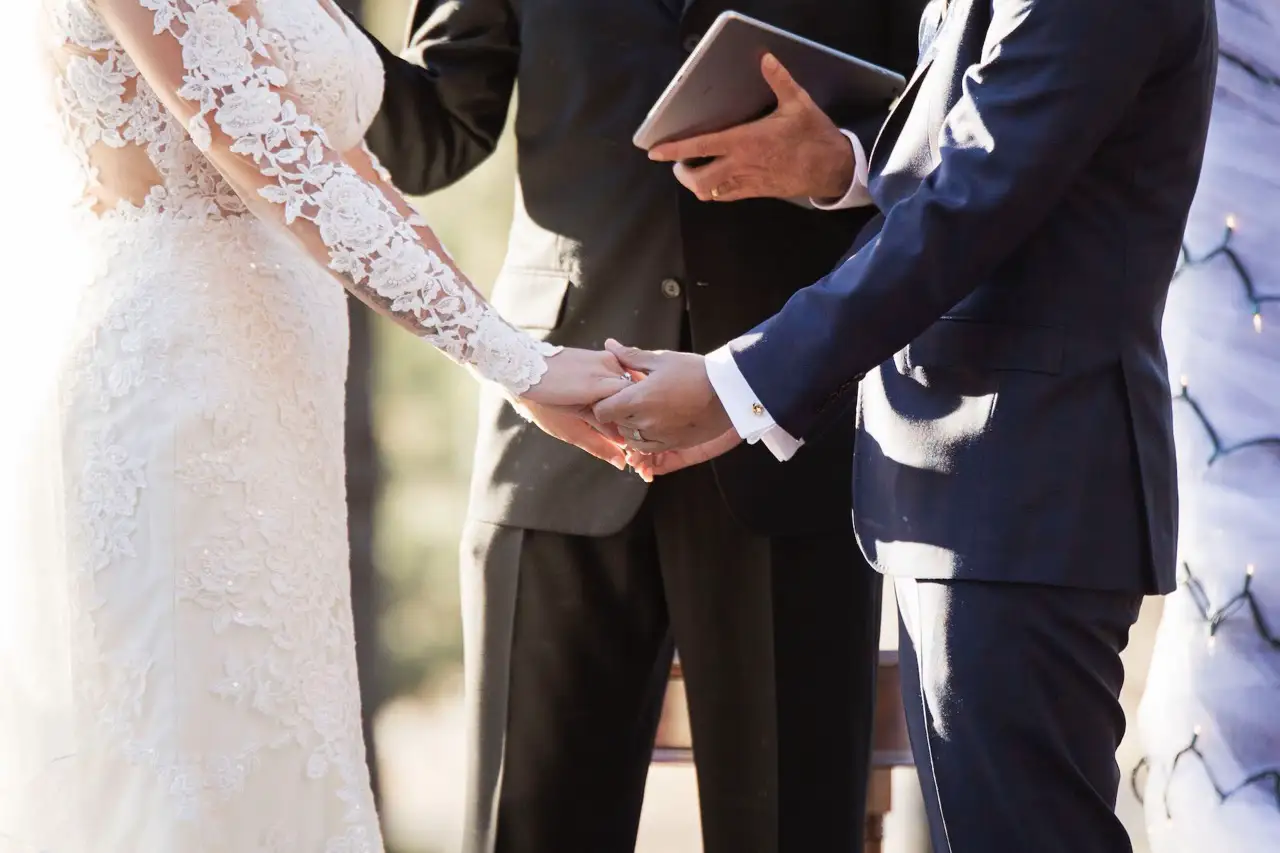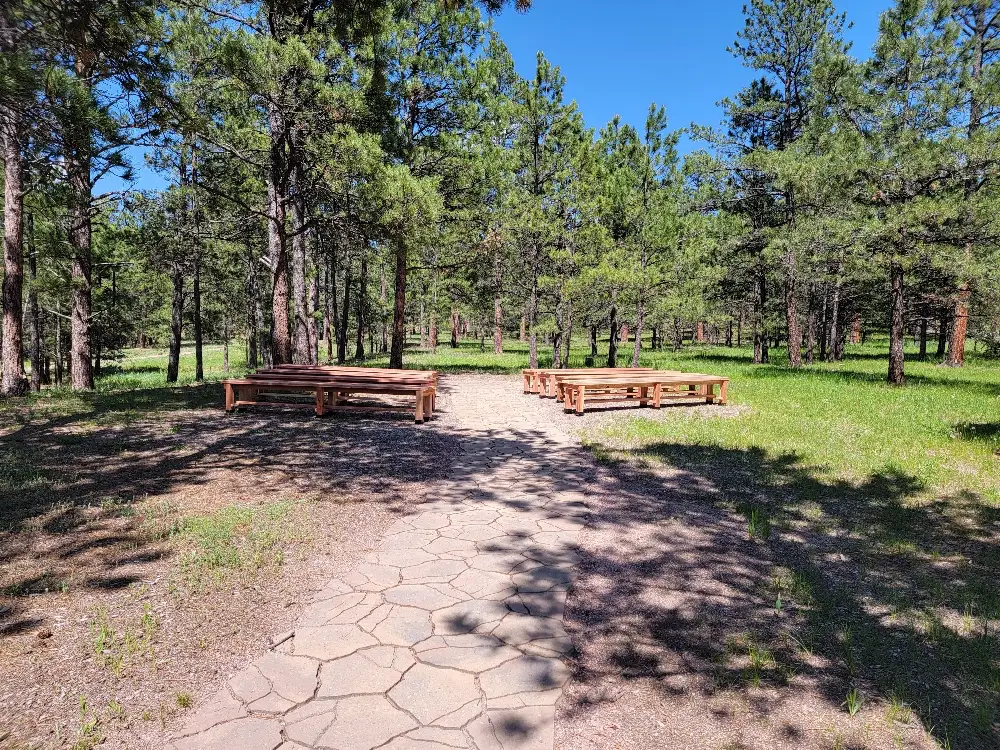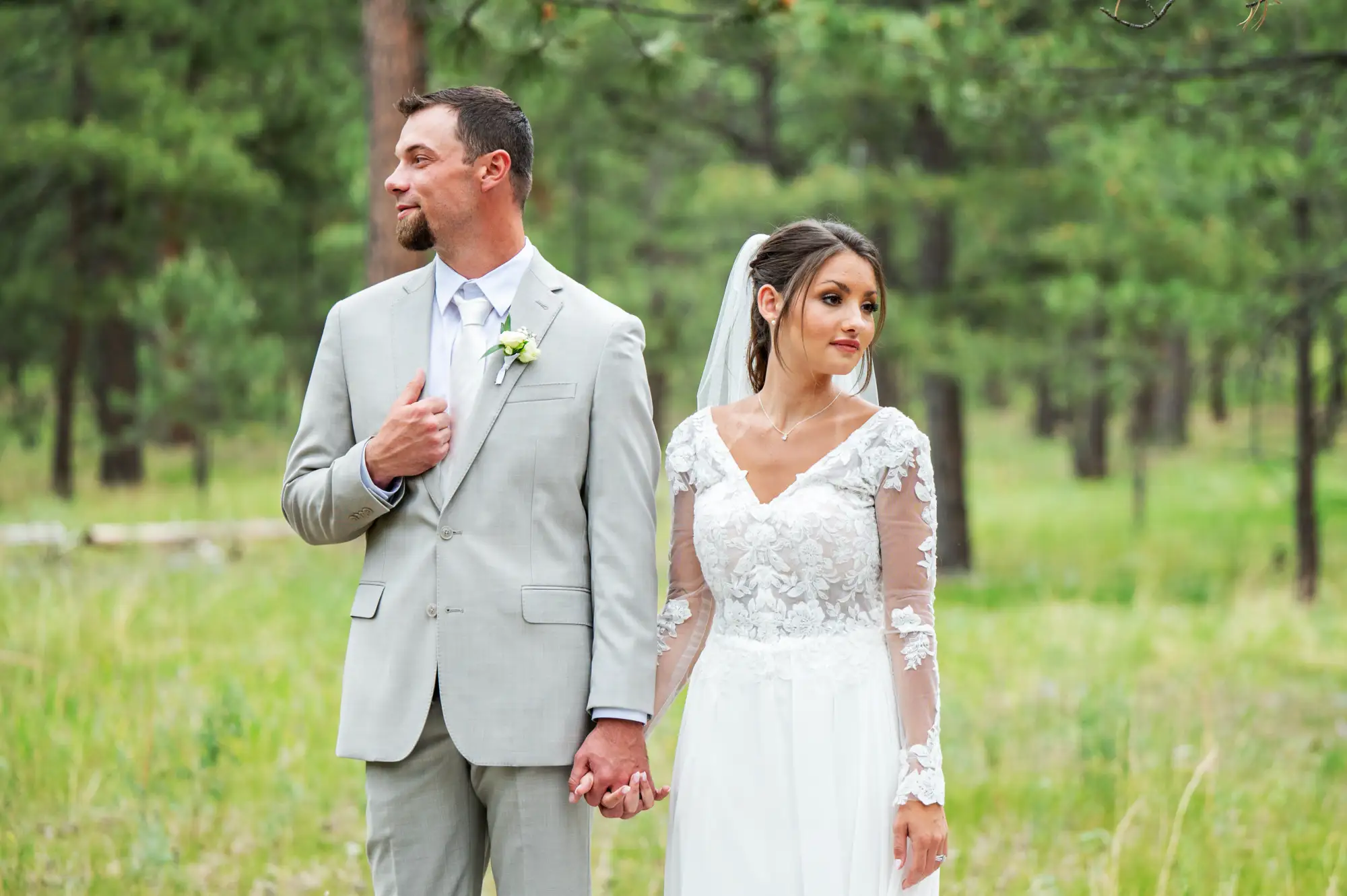Wondering how to find a wedding venue that suits your needs? This post cuts through the noise to help you find and secure the perfect place for your big day. From understanding different venue types to knowing when to start your search, we have you covered.
Key Takeaways
- Start your wedding venue search 12 to 18 months in advance to ensure availability and allow ample time for research and site visits.
- Consider personal recommendations and online reviews to gather diverse perspectives on potential venues, but make sure the venue fits your unique wedding style and budget.
- Maintain clear and consistent communication with your venue coordinator and other vendors as you finalize details and make any necessary adjustments leading up to your wedding day.
Understanding What a Wedding Venue Is
A wedding venue is more than just a physical space; it’s the canvas upon which your special day will be painted. At its core, a wedding venue is a designated location where your ceremony and/or reception will take place. It typically includes areas for the ceremony, guest seating, and separate spaces for both sides of the wedding party to prepare. But beyond these basic elements, a venue can offer so much more, shaping the entire atmosphere and experience of your celebration.
The beauty of wedding venues lies in their diversity. From traditional churches and banquet halls to unique locations like Colorado lodges, art galleries, vineyards, or even destination spots in exotic locales, the options are virtually endless. As we delve deeper into the world of wedding venues, you’ll discover how to find the best wedding venues that perfectly align with your vision and needs. Some venues offer all-inclusive packages that cover everything from catering to decor, while others provide a blank slate for you to customize to your heart’s content. For example, our wedding venue in Colorado Springs offers both options. Many couples choose to hold both their ceremony and reception at the same wedding location, simplifying logistics and creating a seamless experience for guests at their chosen reception venues.
When to Start Your Venue Search
Timing can definitely be a factor when it comes to securing your dream wedding venue. Ideally, you should begin your venue search 12 to 18 months before your intended wedding date. This may seem like a long lead time, but popular venues can book up quickly, especially for peak wedding seasons. By starting your search early, you increase your chances of securing a place that both meets your requirements and is available on your preferred date. An early start to your search is a significant factor in finding the ideal venue.
Starting your search early gives you plenty of time to thoroughly research potential venues, arrange site visits, and pose crucial questions. This early start is particularly crucial if you have your heart set on a specific date or if you’re planning a wedding during a popular time of year. For high-demand venues, it’s advisable to schedule tours about 12 months or more ahead of your wedding date.
Remember, delaying your venue search could result in fewer options and potential compromises on your vision. So, as soon as you’ve decided to tie the knot, make finding your venue a top priority on your wedding planning checklist.
However, if you find yourself on a shorter timeline, don’t be discouraged. Many venues have cancellations or unexpected openings that can be taken advantage of. Reach out to venues directly to inquire about last-minute availability. With a bit of flexibility and persistence, you can still find a beautiful venue that meets your needs and makes your wedding day special.
Researching Potential Venues
Your quest for the perfect wedding venue starts with detailed research. In today’s digital age, the internet is an invaluable tool for this initial exploration. Start by using Google to find wedding venues near me or perform several seraches around your target area. This will give you a broad overview of the options available and help you start compiling a list of potential venues. As you browse, pay attention to the styles, capacities, and amenities offered by different venues to get a sense of what appeals to you.
While online research is a great starting point, don’t underestimate the power of personal recommendations. Reach out to friends, family members, and colleagues who have recently tied the knot. Their firsthand experiences can provide valuable insights that you might not find online. These personal recommendations can often lead you to hidden gems or help you avoid potential pitfalls.
While collecting information from diverse sources, maintain an open perspective. You might be surprised by a venue that you hadn’t initially considered but that turns out to be perfect for your vision.
Seeking Recommendations
In your pursuit of the perfect wedding venue, personal recommendations can provide a wealth of information. Friends, family, and colleagues who have recently tied the knot can offer unique insights into venues they’ve encountered during their own wedding planning journey. These personal accounts often reveal details about the venue’s atmosphere, service quality, and overall experience that you might not find in official descriptions or promotional materials.
Don’t limit your inquiries to just your immediate circle. Wedding vendors, such as photographers, planners, and florists, can be invaluable resources as well. Their experience working with various venues and outside vendors gives them a unique perspective on the pros and cons of different locations. Remember, while these suggestions are highly beneficial, your tastes and preferences may not align with those of others. Use these suggestions as a starting point, but don’t feel obligated to choose a venue solely based on someone else’s experience or their own vendors.
After all, this is your special day, and the venue should reflect your unique vision and style.
Narrowing Down Your Options
As your list of potential wedding venues grows, the next essential step is to refine your choices. This process involves carefully considering several key factors that will significantly impact your big day. Start by finalizing your budget, as this will be a primary determinant in your venue selection. It’s essential to establish a clear financial framework before falling in love with a venue that might be beyond your means. Remember, the venue often consumes a significant portion of your overall wedding budget, so getting this right is crucial.
Next, consider your guest count. Having a rough estimate of how many people you plan to invite will help ensure that the venues you’re considering can comfortably accommodate your celebration. Additionally, think about your wedding style or theme. The venue you choose should align with and enhance your vision for the day.
A careful examination of these factors – budget, guest count, and wedding style – will help you curate a shortlist of venues that satisfy both your practical requirements and align with your dream wedding vision. This focused approach will make your final decision much easier and more confident.
Finalizing Your Budget
Establishing a transparent and achievable budget forms the bedrock of successful wedding planning, especially in relation to venue selection. Your budget will influence every aspect of your wedding, from the location to the guest list and even the date. It’s important to establish this financial framework early in your planning journey to avoid potential disappointment or financial strain later on.
In finalizing your budget, engaging in candid conversations with your partner and any family members who might be contributing financially is crucial. Determine who will be paying for what and how much each party is comfortable spending. Consider factors such as your location and the size of your wedding, as these can significantly impact costs.
Once you have a clear budget in mind, allocate a portion specifically for the venue. Many experts suggest dedicating about 50% of your total budget to the reception, which includes the venue, food, and drinks. By booking your venue early, you’ll be able to more accurately budget for other aspects of your wedding, such as decor, attire, and entertainment. Remember, it’s always better to overestimate costs slightly and be pleasantly surprised than to underestimate and face financial stress as your wedding day approaches.
Creating a Guest List
Drawing up a guest list is a key component of the wedding planning process, especially in relation to venue selection. The number of guests you plan to invite will directly impact the size of the venue you need and, consequently, your budget. It’s important to draft your guest list before you start seriously considering venues to ensure that the spaces you’re looking at can comfortably accommodate your celebration.
When creating your guest list, start by sitting down with your partner and discussing who you both want to invite. Consider:
- Family members
- Close friends
- Colleagues
- Plus-ones
Remember to account for out-of-town guests who might need accommodation options. While it’s tempting to invite everyone you know, keep in mind that each additional guest increases your overall costs.
If you’re working with a tight budget, you might want to consider the growing trend of micro-weddings, which typically involve no more than 50 guests. These intimate celebrations can significantly reduce costs while still creating a magical and memorable experience. Whatever size you decide on, having a clear guest count will help you narrow down your venue options and ensure that everyone on your list can comfortably be part of your special day.
Matching Venue to Wedding Style
An exhilarating aspect of selecting a wedding venue is discovering a location that perfectly matches your dream wedding style. The venue you select will set the tone for your entire celebration, influencing everything from your decor choices to your attire. It’s crucial to consider your wedding style and aesthetic when evaluating potential venues to ensure that all elements of your big day contribute to a cohesive and beautiful atmosphere.
When matching your venue to your wedding style, think about the overall ambiance you want to create. Are you dreaming of a rustic wedding with twinkling lights and wildflower bouquets? Or perhaps you’re envisioning a sleek, modern celebration? By selecting a venue that naturally fits your desired aesthetic, you can minimize the need for extensive decorations and transformations, potentially saving both time and money.
As you tour potential venues, try to visualize your wedding decor and photography in the space. Does the venue’s existing decor and architecture complement your vision, or will it require significant alterations? Remember, the goal is to find a venue that enhances your wedding style, creating a seamless and authentic backdrop for your love story to unfold.
Touring and Evaluating Venues
After narrowing down your list of potential venues, the next step is to conduct a site visit and evaluate them in person. There’s simply no substitute for seeing a space with your own eyes and experiencing its atmosphere firsthand. These visits will give you a much clearer picture of each venue’s layout, amenities, and overall vibe, helping you envision how your wedding day might unfold in that space.
If possible, schedule your visits around the same time of day and season as your planned wedding. This will give you a more accurate sense of the lighting, temperature, and overall ambiance you can expect on your big day.
During each tour, pay close attention to the venue’s size, layout, and overall atmosphere. Try to envision how your guests will move through the space, where key moments like the ceremony and first dance will take place, and how the venue’s existing decor will complement your wedding style. Remember, these tours are not just about seeing the space – they’re also an opportunity to ask detailed questions about pricing, policies, and logistics.
A detailed evaluation of each venue prepares you to make an informed decision that aligns with your vision and requirements.
Scheduling Site Visits
When the time comes to arrange site tours, planning these visits well in advance, ideally a year before your intended wedding date, is advantageous. This early planning not only ensures you have access to your preferred dates but also allows ample time for decision-making and subsequent planning steps. As you arrange these visits, try to schedule them close together, perhaps over a weekend or a few days. This approach allows for easier comparison while the details of each venue are fresh in your mind.
During these site visits, come prepared with a comprehensive list of questions. This preparation is crucial to ensure you gather all the necessary information to make an informed decision. Your questions should cover a wide range of topics, including:
- Pricing details
- Capacity limits
- Vendor policies
- Available amenities
- Any restrictions the venue might have
Don’t hesitate to ask about anything that’s important to you, no matter how small it might seem.
Remember, these visits are your opportunity to envision your wedding day in the space and to clarify any doubts or concerns you might have. The more information you gather during these visits, the more confident you’ll feel in your final venue choice.
Assessing Amenities and Services
In evaluating potential wedding venues, a thorough assessment of the amenities and services offered by each location is essential. Start by understanding the venue’s policies regarding alcohol and catering. Some venues have in-house catering services, while others allow or require you to bring in external vendors. If the venue provides catering, make sure to inquire about menu options, tasting sessions, and any flexibility in customizing the offerings. For venues that allow external catering, check if there are any restrictions or additional fees involved. Similarly, confirm the venue’s liquor license status and any rules regarding alcohol service.
Next, consider the comfort and convenience factors for your guests. Here are some things to evaluate:
- Climate control systems: especially important if you’re planning an event during extreme weather conditions
- Accessibility of the space: check the number and location of restrooms, the presence of elevators or ramps for guests with mobility issues, and the overall flow of the space
- Parking: inquire about on-site parking availability, valet services, or nearby parking options for your guests
- Accommodation options: if you’re expecting out-of-town guests, look into nearby accommodation options
- Transportation services: consider providing transportation services for your guests, or at least provide information on public transportation options
Taking these factors into account will ensure that your guests have a comfortable and convenient experience at your event.
Lastly, don’t forget to ask about the availability of essential rentals like:
- tables
- chairs
- linens
- audio-visual equipment
Understanding what’s included in the venue rental and what you’ll need to source externally will help you better estimate your overall costs and planning needs.
Considering Backup Plans
In your evaluation of wedding venues, considering potential contingencies is crucial, especially for outdoor locations or during seasons with unpredictable weather. A solid backup plan can be the difference between a seamless celebration and a stressful scramble on your big day. Always inquire about the venue’s options for inclement weather. Do they have indoor spaces available, or can they quickly set up weatherproof tents? Understanding these alternatives will give you peace of mind and ensure your celebration can proceed smoothly, rain or shine.
Beyond weather considerations, it’s important to discuss the venue’s protocol for other unexpected situations. This could include power outages, vendor no-shows, or last-minute changes in guest count. Ask about their experience handling such scenarios and what measures they have in place. For outdoor venues, check if they have provisions like non-slip ramps or extra rugs to ensure guest safety in case of wet conditions.
Remember, while it’s not pleasant to think about things going wrong on your wedding day, being prepared for all possibilities will ultimately contribute to a more relaxed and enjoyable experience for you and your guests.
Making the Final Decision
Having toured potential venues and collected all the required information, you now arrive at the thrilling, albeit sometimes intimidating task of finalizing your decision. This is where all your research and preparation come into play. A helpful strategy at this stage is to create a comparison chart that organizes the details of each venue you’ve visited. This visual aid can help you see at a glance how each location measures up in terms of:
- cost
- capacity
- amenities
- any other factors that are important to you
While refining your choices, consider the alignment of each venue with your vision and logistical requirements. Think about the overall feeling you had while visiting each place. Could you envision your celebration unfolding there? Does it match the atmosphere you want to create for your big day? It’s also important to decide whether the specific date or the venue itself is more important to you. If you have your heart set on a particular date, you may need to be more flexible with your venue choice, and vice versa.
Trusting Your Instincts
Though considering all the practical aspects of a wedding venue is important, never undervalue the role of your intuition in this decision-making process. As you visit each location, pay close attention to how you feel in the space. Does it excite you? Can you easily envision exchanging vows and celebrating with your loved ones there? Your emotional response to a venue can be an invaluable resource in making your final choice. If a particular venue gives you a sense of joy and anticipation for your wedding day, that’s a strong indicator it might be the right fit.
Trust these instincts, as they often reflect your subconscious processing of all the information you’ve gathered. However, balance this gut feeling with the practical considerations you’ve outlined. The perfect venue will ideally satisfy both your emotional and logical criteria.
Negotiating Contracts
Once you’ve decided on your dream venue, the next key step is to negotiate and finalize the contract. This process requires careful attention to detail and a clear understanding of what’s included in the venue rental fee. Always clarify what exactly is covered in the base price to avoid any unexpected charges down the line. This might include items like:
- tables and chairs
- linens
- tableware
- basic decor elements
Understanding these inclusions can help you budget more accurately for additional rentals or services you might need.
It’s equally important to familiarize yourself with the venue’s policies and any restrictions they might have. For instance, some venues have specific rules about decorations, noise levels, or end times. Additionally, inquire about their policy on external vendors. Some venues require you to choose from a list of preferred vendors, while others allow you to bring in your own. If you have your heart set on particular vendors, make sure the venue’s policy aligns with your preferences. Don’t hesitate to ask for clarification on any points in the contract that seem unclear. Remember, this is a significant investment, and you have the right to fully understand what you’re agreeing to. If there are aspects of the contract you’d like to change, don’t be afraid to negotiate. Many venues are willing to make reasonable accommodations to secure your booking.
Coordinating with Your Chosen Venue
Once the contract is signed and your dream venue is secured, the substantial task of coordinating your wedding day commences. This phase is all about clear communication and meticulous planning to ensure every detail of your vision comes to life. Begin by forging a robust communication line with your venue coordinator. They will be your primary point of contact and an invaluable resource throughout the planning process.
One of the advantages of finalizing your venue early is that it gives you ample time to coordinate with other vendors. Use this time wisely to schedule and book other essential services like photographers, florists, and DJs. Many of these vendors will need to liaise with the venue directly, so having your venue secured early can make this process much smoother. Remember, your venue coordinator can often provide recommendations for trusted local vendors who are familiar with the space.
As you progress through your planning journey, keep your venue in the loop about any changes or updates to your plans. Regular communication will help ensure that everyone is on the same page and working towards creating your perfect wedding day.
Communicating with the Venue
Maintaining effective communication with your chosen venue is integral to a seamless and successful wedding day. Here are some tips to help you stay in touch with your venue:
- Start by establishing a clear point of contact at the venue.
- Discuss their preferred method of communication, whether it’s email, phone calls, or in-person meetings, and agree on a timeline for regular check-ins.
- During these conversations, don’t hesitate to ask questions or voice concerns.
By following these tips, you can ensure that you and your venue are on the same page and that your wedding day goes smoothly.
Topics to discuss might include:
- The timeline for payments
- Deadlines for finalizing details like menu choices or floor plans
- Any changes to your initial plans
- Keeping the venue informed about your other vendors, especially those who will need access to the space before or during the event
Remember to document all important communications in writing to avoid any misunderstandings.
Clear, consistent communication will help ensure that your venue is fully prepared to bring your wedding vision to life.
Finalizing Details
As the wedding day draws near, it’s time to finalize all the significant details with your venue. This process typically begins a few months before the big day and involves confirming everything from your final guest count to your seating arrangements. Start by reviewing the venue’s floor plan and working with your coordinator to finalize the layout for both your ceremony and reception. This is the time to decide on the placement of key elements like:
- the dance floor
- DJ booth
- gift table
- any special features you’re incorporating
Next, confirm your final guest count with the venue. This usually needs to be done about six to eight weeks before the wedding to allow for proper planning of catering and seating arrangements. During this time, you should also:
- Finalize your menu choices, including any dietary restrictions or special meal requests.
- If your venue is providing coordination services, schedule a meeting to go over all the details of your day, including the timeline, florals, and any special requests.
- Don’t forget to discuss the setup and breakdown times, ensuring that all your vendors have the access they need.
Regular updates and follow-ups with your venue coordinator can help preempt any potential issues and ensure that everyone is on the same page for your big day.
Working with a Wedding Planner
Should you decide to engage a professional wedding planner, you’ve made a decision that can greatly streamline the coordination process with your venue. A seasoned wedding planner brings a wealth of experience and industry connections that can be invaluable throughout your planning journey. Ideally, you should consider booking a wedding planner before choosing your venue. Their expertise can guide you in selecting a space that not only matches your vision but also aligns with practical considerations such as:
- permitting requirements
- cost efficiencies
- guest experience
- transportation logistics
Once you’ve secured your venue, your wedding planner becomes a crucial liaison between you and the venue staff. They can assist in communicating your vision, coordinating with all vendors, and ensuring that every detail is accounted for. Your planner will work closely with the venue to manage the delivery schedule for all vendors, ensuring a smooth setup process on the day of your wedding. They can also help in personalizing the venue space to fit your wedding theme, offering creative solutions that respect the venue’s guidelines while bringing your unique vision to life.
Remember, a good wedding planner:
- Handles logistics
- Advocates for your needs
- Troubleshoots any issues that arise
- Ensures that your wedding day unfolds exactly as you’ve dreamed.
Summary
Choosing the perfect wedding venue is a journey filled with excitement, challenges, and ultimately, rewarding decisions. From understanding what a wedding venue entails to researching options, narrowing down choices, and finally coordinating with your chosen location, each step plays a crucial role in creating your dream wedding. Remember, the ideal venue is one that not only fits your practical needs but also resonates with your personal style and vision for your special day. As you embark on this adventure, trust your instincts, do your due diligence, and don’t hesitate to seek help when needed, whether from loved ones or professional planners. Your wedding venue will set the stage for one of the most memorable days of your life, so take the time to find a place that truly feels like ‘the one’. With careful planning, open communication, and a clear vision, you’ll create a celebration that reflects your love story and leaves you with beautiful memories for years to come.
Frequently Asked Questions
How far in advance should I book my wedding venue?
If possible, you should book your wedding venue 12-18 months in advance, especially for popular dates or locations.
What should I consider when choosing a wedding venue?
When choosing a wedding venue, consider your budget, guest count, desired wedding style, location, available dates, and included amenities to find the perfect fit for your special day.
Should I hire a wedding planner before or after choosing a venue?
Hiring a wedding planner before choosing a venue can be beneficial, as they can provide valuable insights and help find a venue that fits your needs and budget.
What questions should I ask during a venue tour?
During a venue tour, be sure to ask about pricing, capacity, available dates, included amenities, vendor policies, payment schedules, and any restrictions or rules the venue may have. This will help you make an informed decision.
How do I know if a venue is the right fit for my wedding?
Look for a venue that fits your budget, can accommodate your guest list, matches your wedding style, and gives you a positive feeling when you visit. Consider both practical aspects and your instincts when making your decision.




